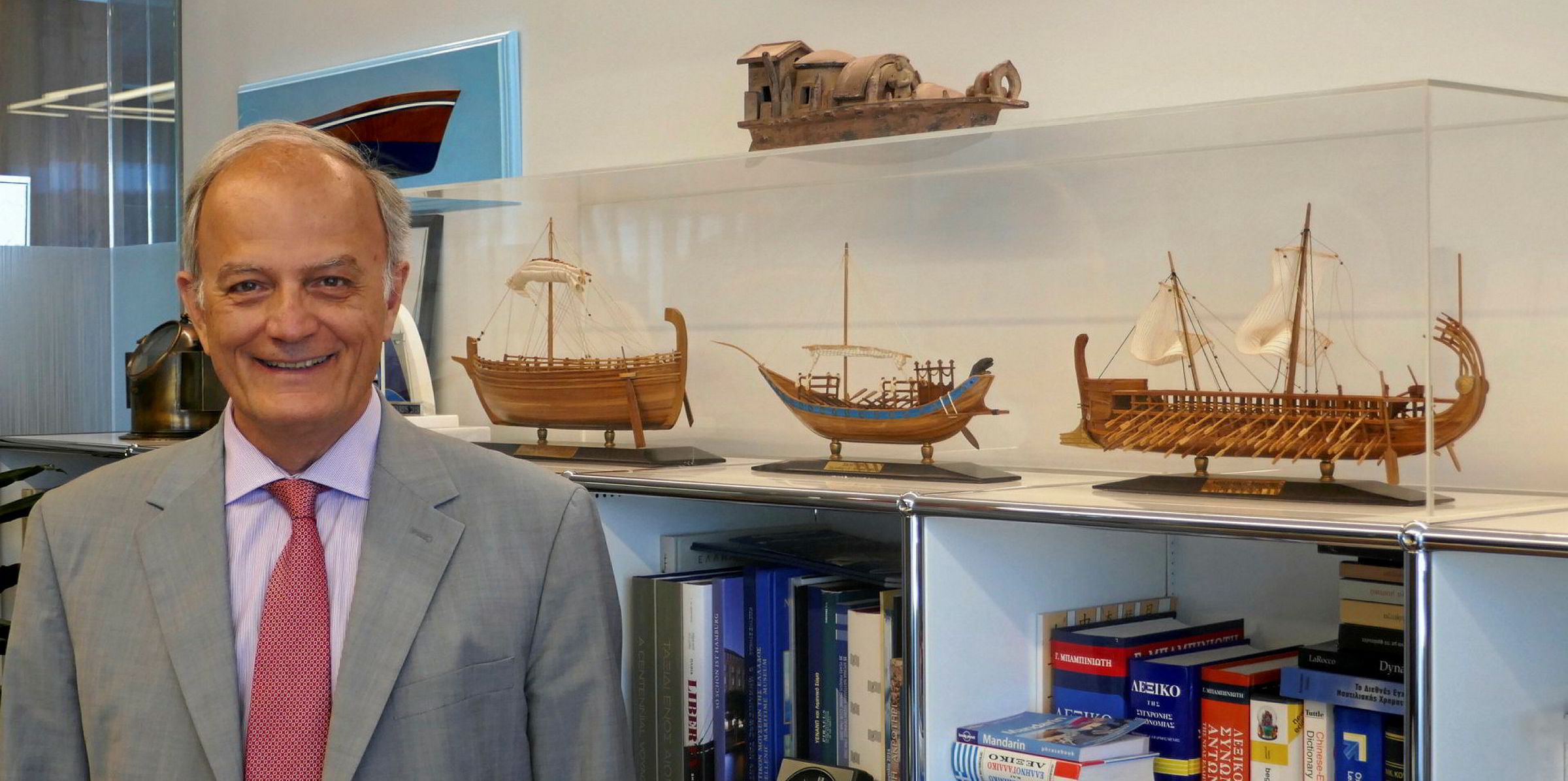Three miniature models of ancient Greek ships adorn the office of John Platsidakis, in the Angelicoussis group’s new Athens headquarters.
They serve as a constant reminder that going back to wooden sailboats looks like the only way to meet the impossible tasks foisted on the shipping industry, he says, tongue-in-cheek.
A trained mathematician, economist and former shipping banker, Platsidakis does not mince his words — especially when it comes to criticising an onslaught of environmental IMO rules kicking off next year.
“Regulations should reflect reality," he says in an interview with TradeWinds. "They shouldn’t be adopted on a whim to placate media and NGOs [non-governmental organisations], none of whom base their demands on scientific analysis.”
He stresses that these are his personal views, which neither reflect the position of the Angelicoussis Shipping Group, where he is managing director, nor that of dry bulk owners’ association Intercargo, of which he is the honorary chairman.
As a case in point, he cites the target to cut the CO2 emissions of merchant vessels by 40% within the next 11 years.
'Horse trading rather than scientific analysis'
“That target resulted from horse trading between IMO member states rather than from any scientific analysis,” he says. “Why 40%? Why not 30%? Or 60%? No-one can tell.”
In Platsidakis’ view, the debate around greenhouse gas reductions suffers from an even deeper flaw: it fails to put charterers, refiners, shipbuilders and engine manufacturers on the spot.
“If these four players don’t play ball, nothing can happen,” he says, urging governments to turn their regulatory firepower on that group rather than on shipowners.
Platsidakis has been using an analogy from onshore transport to get his point across: nobody thinks of holding firms such as Hertz or Avis responsible for the carbon their cars emit. Common sense suggests their amount depends on how frequently those firms’ clients use them, what kind of vehicles the car industry supplies them with and on the properties of the fuels they are running on.
Bunkers have to become more expensive to make users more cost-conscious and provide incentives to shipyards and engine manufacturers to come up with technologies adequate to cope with higher fuel prices without disrupting world trade
John Platsidakis
Shipowners have a built-in interest to buy the most fuel-efficient vessels in order to reduce bunker costs and be able to offer cheaper freight rates in a cut-throat competitive environment, Platsidakis argues.
However, responsibility for how much carbon these ships emit ultimately lies with the shipyards that build them, the engineering companies that design their engines, the refineries that produce their fuel and “certainly” with charterers, who set the speed at which they sail.
Shipowners 'under fire'
“Nevertheless, the only group that’s under fire and whose members face restrictions and sanctions are shipowners,” Platsidakis says.
For example, mandating cleaner fuel from 1 January 2020 onwards makes no sense if refineries are not under any obligation to set aside part of their production to cover the shipping industry’s needs, he argues.
“We’ve been cast into the unknown,” says Platsidakis, who has spent all but one of his 31 years in shipping with the Angelicoussis Group. “That’s very unfair for an industry that carries 90% of world trade efficiently and with such great respect to the environment.”
An alumni of the London School of Economics, from which he obtained a degree in Operational Research in 1976, Platsidakis has an unshakeable belief in market forces, which he believes can provide the only effective answer.
“In my humble opinion, only a levy on fuel will work,” he says.
Bunkers have to become more expensive to make users more cost-conscious and provide incentives to shipyards and engine manufacturers to come up with technologies adequate to cope with higher fuel prices without disrupting world trade.
'Gimmicks'
“At the end of the day, it’s consumers who will pay for a cleaner environment," he says. "It’s better to tell them right away instead of setting fairytale targets or conjure up gimmicks like slow-steaming.”
Platsidakis admits that such a course is difficult. He points to France, where a proposed gasoline tax increase at the end of last year caused ructions and contradictory results — from riots by protesting car drivers to a surge in the Green Party vote in last month’s European elections.
“There’s too much sloppy thinking around these issues," he says. "People believe clean environment is a free lunch. It’s not.”
Platsidakis — until last year the executive president at Intercargo — blames much of the shipping community itself for failing to steer the debate in the direction that he believes is right.
By unreservedly pledging to meet environmental goals set by politicians under the pressure of green groups, he says shipping functionaries are admitting guilt where there is none.
“With enormous respect to people who look at this in a different way, I believe we’re sending the wrong message that the regulations are meaningful, achievable and that it’s a good thing they come,” he says.
He argues that going along with the new rules just to show goodwill makes no sense either, since it will both lead to sub-par environmental results and fail to improve the shipping industry’s image.
“In order to serve the interests of our society, we have to explain to the regulators and the public what is feasible,” he says.






